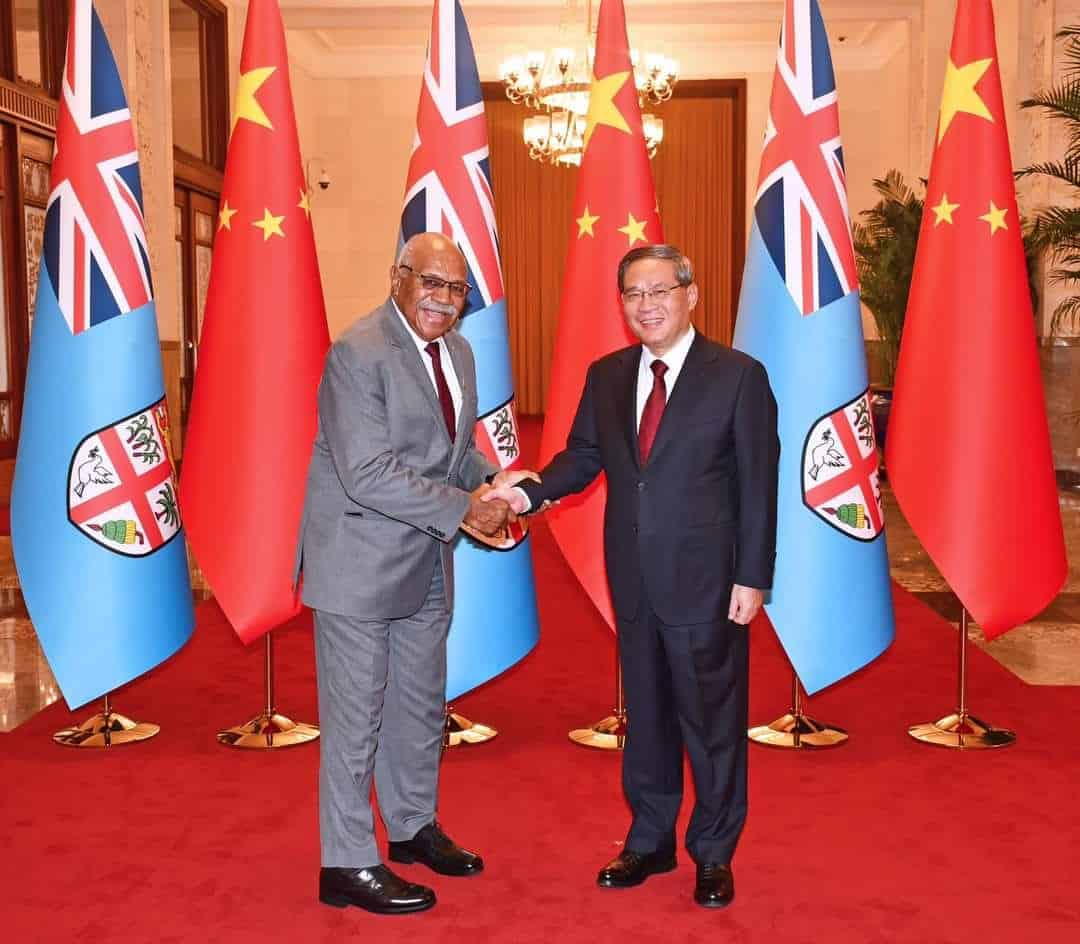China has pledged to support Fiji’s development in a world beset with “turmoil” and help tackle the impact of climate change during Prime Minister Sitiveni Rabuka’s visit to Beijing, reports the South China Morning paper.
Rabuka met Xi in Beijing’s Great Hall of the People after touring the length and breadth of China for more than a week.
President Xi Jinping, who met Rabuka on Tuesday, told him that China attaches “great importance” to the relationship and “is willing to continue to provide assistance to Fiji in economic and social development”.
“(Our) two countries have always supported and helped each other as good friends, good partners, and have become a model of being equals and friendly cooperation between countries large and small,” Xi told Rabuka.
He said Beijing was keen to “promote the building of a China-Fiji community with a shared future in a world of turmoil and chaos, and to bring more benefits to our people.”
Xi also praised Fiji’s recent sporting successes in rugby, for which it won a silver medal at the Paris Olympics last month.
Rabuka thanked the Chinese leader, telling Xi that “Fiji stands ready to send rugby coaches and players to come to China to play with Chinese teams.”
He also hailed Xi’s meeting last year with U.S President Joe Biden in San Francisco, where he said “you might have achieved peace for the world.”
Rabuka has taken a more cautious line over China’s growing security interests in the Pacific, praising Fiji’s warming ties with Beijing while saying he preferred to deal with democratic “traditional friends” on security.
State broadcaster CCTV reported that he also said China is ready to assist Fiji and other Pacific island countries “in dealing with climate change” and work to make the Pacific Ocean “an ocean of peace, friendship and cooperation”.
In turn, Rabuka expressed interest in learning from China’s successes in fighting poverty and developing its infrastructure, according to CCTV.
Rabuka’s first visit as prime minister comes at a time of heightened geopolitical tensions in the Pacific, where various global powers are seeking to assert their influence.
As well as meeting Xi, Rabuka’s 10-day trip included a meeting with Premier Li Qiang, tours of the economic hubs of Zhejiang and Fujian, and a trip to Yunnan, a key province in the country’s poverty alleviation efforts.
During their discussions on Sunday, Rabuka and Li agreed to enhance cooperation in a range of areas, including infrastructure, agriculture, fisheries, light industry, education, tourism and poverty alleviation, according to China’s foreign ministry.
Rabuka highlighted Fiji’s eagerness to work with China on “poverty alleviation, infrastructure development including land and maritime connectivity, the Belt and Road Initiative and rural revitalisation,” a Facebook post by the Fijian government said.
Rabuka’s visit followed similar trips by leaders from the Solomon Islands and Vanuatu as part of Beijing’s broader strategy to bolster influence in Oceania.
Mihai Sora, director of the Pacific Islands Programme at the Lowy Institute in Australia, said: “China is eager to strengthen its relations with key Pacific leaders as part of its ambition to increase its political access and influence in the Pacific … The visits signal China’s ongoing ambition to deepen its political influence in the Pacific, with the objective of increasing its strategic access to the region.
“Fiji holds significant geopolitical importance for China due to its central location in the South Pacific, its leadership role within the key institutions, such as the Pacific Islands Forum, and its informal influence over regional dynamics,” he said.
Earlier this year, Rabuka decided to review a controversial policing agreement signed in 2011 allowing Chinese police officers to be stationed in Fiji.
Suva eventually upheld the agreement – which also saw Fijian officers being trained in China while Beijing provided equipment such as surveillance gear and drones – but Chinese police will no longer be deployed inside Fiji.
In 2022, China and the Solomon Islands signed a similar policing pact, while Papua New Guinea confirmed in February that a similar deal was in the pipeline.
“The increased tensions in the region arise from China’s push into the security space, particularly when considered alongside its actions in the South China Sea,” Sora said.
However, he said positive relations with Fiji largely relied on economic ties as the country, like most Pacific Island nations, had “made clear strategic choices so far, siding with the United States and Australia for security cooperation”.
But such cooperation has attracted further scrutiny – primarily from Canberra and Washington – because of geopolitical concerns and Chinese loans, mostly in the form of aid, to Pacific nations.
Last year, when Fiji said it was likely to work with China to develop its ports and shipbuilding industry, it immediately drew questions from regional stakeholders concerned about China’s influence.
By April last year, Fiji owed the Export-Import Bank of China at least US$167 million, according to a government report. Chinese grants and loans to island nations fell to US$241 million in 2021 from a peak of US$384 million in 2016, according to the Lowy Institute, which said Australia remained their biggest donor by some measure.
